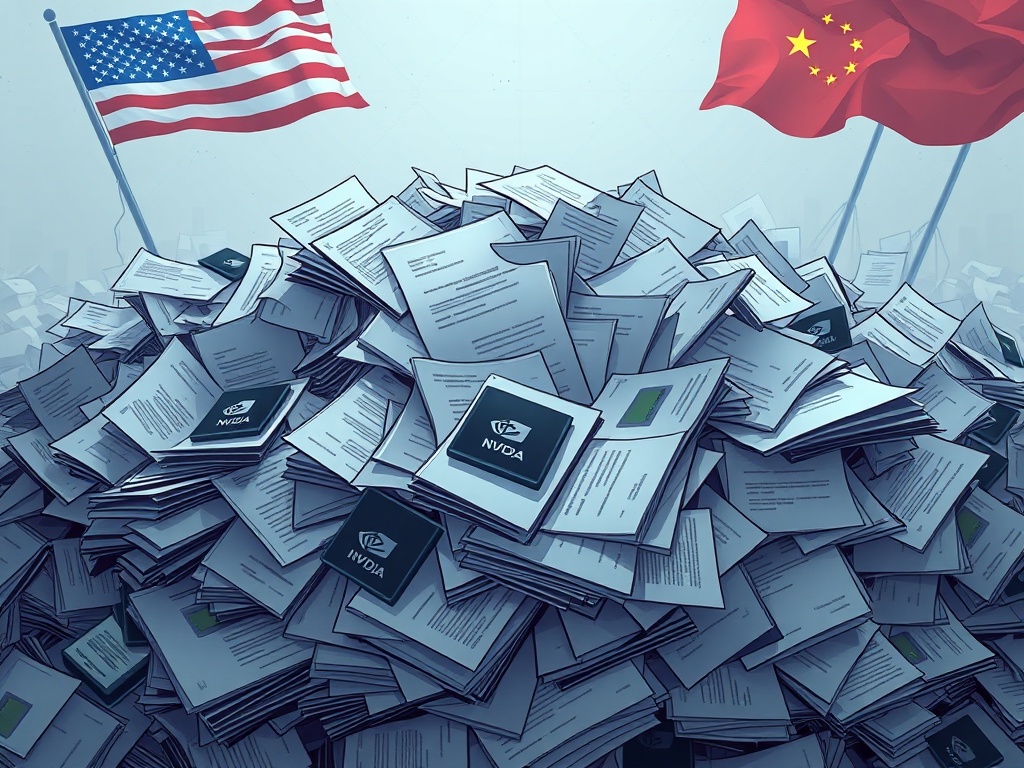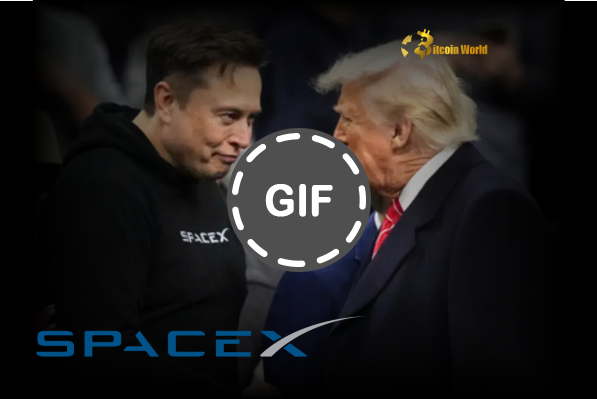BitcoinWorld

Nvidia H20 Licenses Stalled: A Critical Setback for AI Chips Amidst Commerce Dept Backlog
In the fast-paced world of technology and digital assets, delays in critical sectors like artificial intelligence can send ripples across global markets, including the cryptocurrency ecosystem. The latest development involving Nvidia H20 chip export licenses and a significant Commerce Dept backlog highlights how bureaucratic hurdles can impact even the most powerful tech giants, influencing everything from supply chains to investor sentiment in related fields like blockchain and AI-driven crypto projects.
What’s Holding Back Nvidia H20 Chip Export Licenses?
Earlier in July, there was a glimmer of hope for chipmakers when U.S. Secretary of Commerce Howard Lutnick seemingly gave the green light for companies like Nvidia to resume selling certain AI chips in China. This decision was closely watched, given the ongoing geopolitical tensions and restrictions on advanced technology exports. However, this initial optimism has been overshadowed by a concerning reality: Nvidia has yet to receive the necessary licenses to sell its H20 AI chips, a variant specifically designed to comply with U.S. export controls while still offering powerful AI capabilities.
The H20 chip is a crucial product for Nvidia, aiming to maintain its market presence in China, a significant consumer of high-performance AI hardware. The delay in obtaining these chip export licenses isn’t just a minor hiccup; it represents a significant obstacle for Nvidia’s strategic plans and revenue projections for the second half of 2025.
Understanding the Commerce Dept Backlog: A Deeper Dive
The core of the problem lies within the U.S. Department of Commerce itself. According to Reuters, the department is grappling with a substantial Commerce Dept backlog of licensing applications. This isn’t merely a procedural delay; it points to deeper internal issues within the department, specifically:
- Staffing Shortages: A reported loss of key personnel has left the department understaffed, unable to process the volume of applications efficiently.
- Communication Breakdown: There’s been a reported breakdown in communication channels, not only internally but also between the department and the very industries it regulates. This lack of clear, consistent dialogue can exacerbate delays and create uncertainty for companies navigating complex export regulations.
- Internal Turmoil: The reports suggest a general state of turmoil within the department, which inevitably impacts its operational effectiveness and ability to execute policy directives, even those from its own Secretary.
These internal challenges create a bottleneck that affects not just Nvidia but potentially many other technology companies seeking approval for sensitive exports, directly impacting global supply chains for critical components like AI chips.
The National Security Debate: Why Are Chip Export Licenses So Contentious?
The delays are further complicated by an intense debate among national security experts regarding the sale of Nvidia H20 chips to China. Despite the H20 being a “downgraded” version designed to meet export control thresholds, a group of 20 national security experts is reportedly urging the Trump administration to impose even stricter restrictions. Their primary concern revolves around the potential for these chips, even if less powerful than their top-tier counterparts, to be used by China for military modernization or to advance its own AI capabilities in ways that could pose a threat to U.S. national interests.
This ongoing discussion highlights the delicate balance the U.S. government attempts to strike between maintaining technological leadership, protecting national security, and allowing American companies to compete in global markets. The contention around chip export licenses underscores the strategic importance of semiconductors in the current geopolitical landscape.
Navigating US-China Tech Tensions and Their Impact on AI Chips
The saga of Nvidia’s H20 licenses is a microcosm of the broader US-China tech rivalry. Both nations are locked in a strategic competition for dominance in critical emerging technologies, with artificial intelligence and advanced semiconductors at the forefront. The U.S. has consistently aimed to curb China’s access to cutting-edge AI hardware, fearing its application in military advancements or surveillance technologies. China, in response, has doubled down on its efforts to achieve self-sufficiency in chip manufacturing.
This geopolitical tension directly impacts the global market for AI chips. Companies like Nvidia find themselves caught in the crossfire, forced to adapt their products and sales strategies to comply with evolving export controls. The unpredictability of these policies and the bureaucratic hurdles involved create an uncertain operating environment, affecting investment decisions and technological innovation worldwide.
What Are the Broader Implications for the Tech and Crypto Markets?
The stalling of Nvidia H20 licenses has several significant implications:
- For Nvidia: It could lead to a loss of market share in China, a critical revenue stream, and potentially force a re-evaluation of its strategy for the Chinese market. Delays also mean missed sales opportunities.
- For the AI Industry: Restricted access to high-performance AI hardware can slow down AI development in certain regions, potentially creating a two-tiered system for AI innovation.
- For Global Supply Chains: Such backlogs and policy uncertainties can create instability in global supply chains, affecting the availability and pricing of essential components for various tech sectors.
- For Investors: The situation introduces an element of risk for investors in semiconductor companies and the broader tech sector. It highlights the influence of geopolitical factors and regulatory environments on corporate performance. While not directly impacting crypto prices, the health of the broader tech market, particularly companies involved in GPU production (like Nvidia, whose GPUs are also vital for crypto mining and AI), can subtly influence investor sentiment and capital flows within the digital asset space.
This incident serves as a stark reminder that even as AI promises revolutionary advancements, its progress is inextricably linked to complex political and bureaucratic realities. The future of AI chips and their global distribution will continue to be shaped by these evolving dynamics.
A Path Forward? Addressing the Commerce Dept Backlog
For the situation to improve, the U.S. Department of Commerce will need to address its internal issues. This could involve:
- Increased Staffing: Prioritizing the hiring and training of personnel dedicated to export license processing.
- Streamlined Processes: Implementing more efficient and transparent application review procedures.
- Improved Communication: Establishing clearer lines of communication with industry stakeholders to reduce confusion and accelerate approvals.
- Policy Clarity: Providing consistent and unambiguous guidance on export control policies to help companies navigate the complex regulatory landscape.
Without these improvements, the backlog could continue to hinder American innovation and competitiveness on the global stage, especially in critical areas like advanced AI chips.
Conclusion: The Unseen Hurdles in the Race for AI Dominance
The reported backlog at the Commerce Department, stalling Nvidia H20 chip licenses, is more than just a bureaucratic hiccup; it’s a profound illustration of the complex interplay between technology, national security, and global economics. As the world races towards AI dominance, the availability and distribution of powerful AI chips become paramount. This situation underscores the critical need for efficient governance and clear policy, especially when dealing with technologies that have dual-use potential. For investors and enthusiasts alike, it highlights the often-unseen regulatory hurdles that can significantly impact even the most formidable companies and the broader trajectory of technological advancement. The resolution of this backlog will be a key indicator of how effectively the U.S. can balance its strategic imperatives with the needs of its leading technology firms in the fiercely competitive US-China tech arena.
To learn more about the latest AI market trends, explore our article on key developments shaping AI features.
This post Nvidia H20 Licenses Stalled: A Critical Setback for AI Chips Amidst Commerce Dept Backlog first appeared on BitcoinWorld and is written by Editorial Team





